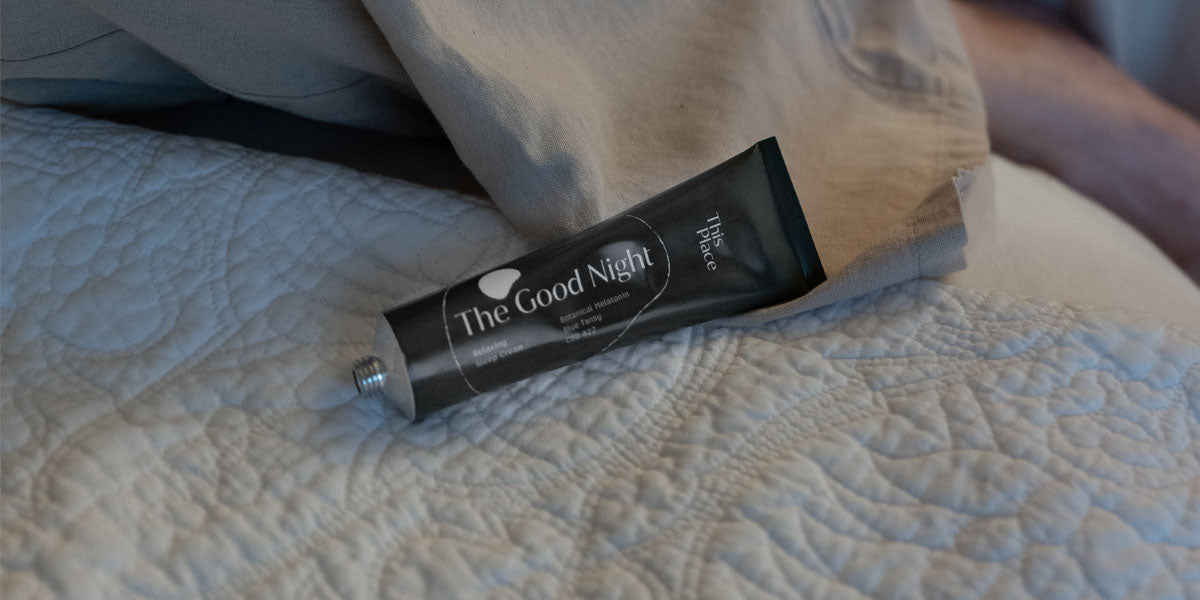Are you tired and lacking energy, even though you slept seven to eight hours during the night? The reason could be that your deep sleep phase is too short. Because in this phase many regeneration processes take place so that you feel fit and rested in the morning. In this article, you'll find out about the different sleep phases, why deep sleep is so important, and how you can actively improve your deep sleep.
- Improve deep sleep: Helpful tips for more energy during the day
- How long should the deep sleep phase last?
- Why is deep sleep so important?
- Improve deep sleep: How to get a better night's sleep
- Improve deep sleep with rituals
- Bottom line on improving deep sleep
- FAQ
- Sources
Improving deep sleep: Helpful tips for more energy throughout the day
Sleeping is essential for the survival of body and mind. Numerous processes take place while we sleep. For example, metabolic waste products are removed and the immune system is strengthened [1], and new cells and growth hormones are formed. In addition, our brain stores and processes the experiences of the day [2].
However, not all sleep is the same. Sometimes you sleep deeply and sometimes only lightly. A distinction is made between two types of sleep [3]. In the so-called REM phase, rapid eye movements (REM) can be seen behind the closed eyelids. In addition, phenomena such as twitching to fall asleep can occur during REM sleep (dream sleep). In addition, people often dream very intensively during this phase. And then there is the non-REM phase, which is divided into the following three sleep stages:
- Stage 1 (falling asleep phase): In this sleep phase, you sleep very lightly and your muscle tone decreases. Your brain activity changes from the alpha waves in the waking phase to the slower theta waves, both of which can be measured in the electroencephalogram (EEG).
- Stage 2 (light sleep): While slight eye movements are still detectable in the falling asleep stage, your eyes stop moving in the surface sleep stage. Your muscles relax further, your pulse and breathing become regular and your body temperature drops.
- Stage 3 (deep sleep stage): Your muscles relax completely in this stage and your blood pressure drops. Your heartbeat and breathing also slow down further. The EEG would show slow delta waves and many people sleepwalk or grind their teeth during this sleep phase.
All sleep phases occur in so-called sleep cycles. This means that in a sleep cycle, the aforementioned sleep phases occur one after the other and are repeated in each sleep cycle. So you are always either in the light sleep phase, deep sleep phase and REM phase.
Duration of the sleep cycles
The duration of sleep cycles usually ranges from 90 to 110 minutes and is repeated about four to seven times per night [4]. In contrast, the duration of the individual sleep phases changes. Deep sleep shortens and REM sleep becomes longer. Before waking up, the REM sleep phase is the longest. Therefore, you can usually remember the dreams better.
How long should the deep sleep phase last?
A healthy amount of sleep is six to eight hours, although sleep requirements can also vary widely and change with age. While five hours may be enough for one person, another may need eight or nine hours of sleep per night.
Sleep researchers estimate that healthy adults spend 15 to 25 percent of their sleep in deep sleep. So to feel fit and refreshed when you wake up, you need about 1.5 to 2 hours of deep sleep [5].
Waking up from deep sleep: Is this possible?
It is very unlikely that you will wake up directly from deep sleep. Your body is so relaxed that you are almost completely unaware of your surroundings. Maybe you overslept on New Year's Eve and asked yourself the next morning why you didn't hear the fireworks? Or did you miss an alarm clock? Then you were probably in a deep sleep.
Of course, it is possible to wake you up from a deep sleep. If this happens, you feel tired and sleepy. Your mind needs a short time to get oriented.
Why is deep sleep so important?
Your body recovers mainly in the deep sleep phases. It uses this time not only for rest, but also for regeneration, in order to, among other things:
- Activate healing processes,
- repair tissue damage,
- produce hormones,
- supply organs and cells with energy, and
- to replace old cells and diseased cells.
If the quality of your deep sleep is poor or you don't get enough deep sleep, you will feel tired, frazzled and lethargic after waking up. If this happens only once in a while or even a few days in a row, it's no reason to worry.
Doctors only speak of a sleep disorder worthy of illness when you lie awake for more than two to three hours at night more than three times a week and this lasts for more than three to four weeks [6]. Your body will not recover and you will endanger your health. In this case, you should urgently consult a doctor.
Improve deep sleep: How to achieve better sleep
Unfortunately, there is no secret that we can reveal here, with which you can improve your deep sleep. Because every person is different and has a different sleep rhythm. In addition, individual life situations such as stress, mental burdens or illnesses can affect sleep. However, there are some tips that may help you fall asleep faster and sleep better through the night.
- Sleep duration: As we explained earlier, your sleep occurs in cycles. It should be noted that not every deep sleep phase is the same. As soon as it gets dark, your body releases more and more of the sleep hormone melatonin to help you get to sleep. It is believed that the most restorative deep sleep occurs in the first four hours before 3 am. Therefore, one tip from sleep researchers is to go to bed between 10 and 11 p.m. [7].
- Bedtime: Another tip is to always go to bed at the same time and get up at the same time. This is because deep sleep can be sensitive to irregular bedtimes.
- Before going to sleep: Nutrition plays a significant role in many areas of life, including when it comes to sleep. Surely you know the phenomenon when you eat a greasy pizza late at night and then sleep restlessly throughout the night. This is because the body actually receives the signal to sleep through the melatonin, so that your digestive tract also comes to rest. Now your body receives a contradictory signal through the fatty and carbohydrate-rich food. Therefore, the tip here is to avoid fats, sugar and carbohydrates three hours before going to bed. In addition, it can be quite helpful to avoid coffee and black tea in the evening, since caffeine is known to make it difficult to fall asleep.
Of course, all these tips are only recommendations and no guarantee that you can sleep better. Optimal sleep hygiene includes many other points that we cannot present here in their entirety. The German Society for Sleep Research and Sleep Medicine provides you with important information.
Rituals to improve deep sleep
Like many other people, you surely long for relaxation after a stressful and nerve-racking day. Some seek distraction by watching TV or looking at their smartphone in bed. Still others think they need to do a strenuous workout before sleeping. However, all of these measures are not very beneficial.
Since your body is a creature of habit and loves fixed routines, you can lower your stress level with regular evening rituals so that you can better fall asleep and stay asleep through the night. Such rituals could be for example:
- If you want to review the day in your head before you go to bed, it might help to write down what you experienced in a diary.
- Reading a good book also promises relaxation - but not on your smartphone, laptop or eBook reader. Make sure it's "light fare" and not nerve-wracking thrillers.
- Meditation and yoga can help relieve stress. According to studies, the body then releases the neurotransmitter gamma-aminobutyric acid, which calms the nerve cells in the brain. As a result, stress and anxiety can be reduced [8].
Evening ritual: benefits of a warm bath
A warm bath can relax your body and mind. Take time for yourself in the evening, and if you like, you can use The Mineral Bath bath powder, which contains naturally nourishing as well as gently revitalizing natural ingredients such as epsom salt, rosemary and cocoa butter, and CBD.
If it feels good to you, you can pamper your skin after the bath with This Place's herbal sleep cream The Good Night. In addition to soothing lavender, the cream also contains hemp extract, palo santo, and blue tansy.
Bottom line on improving deep sleep
Sleeping is essential for survival. The quality of sleep plays an important role, especially the deep sleep phase. Because in this phase you regenerate and recover. To ensure that falling asleep is not a struggle and that you can sleep in a relaxed manner, regular evening rituals can be arranged in a way that is good for you and your body. Take time for yourself, because self-care often gets lost in the hectic everyday life.
FAQ
How much deep sleep per night is normal?
The duration of deep sleep varies from person to person. Adults with a healthy sleep spend about 15 to 20 percent of the total night's rest in deep sleep. If total sleep time is six to eight hours, this means deep sleep lasts between 1.5 and 2 hours. How long a person actually spends in deep sleep can be found out by medical professionals in a sleep laboratory.
Why do I get so little deep sleep?
If the total duration of sleep is too short, deep sleep is often short as well. Various factors can also impair deep sleep, such as stress, psychological problems, fatty and carbohydrate-rich food before bedtime, caffeine, alcohol or even an exhausting workout. Likewise, extraneous influences such as noise or light can severely disrupt sleep. In the end, it always depends on the individual causes and on developing strategies to improve sleep.
What happens if you don't get enough deep sleep?
Basically, sleep and thus also deep sleep are important for health. This is because very important processes take place in the body so that it can recover and regenerate. A temporary lack of sleep is not yet a problem. However, if sleep is permanently disturbed, this can have serious consequences. Not only does concentration and performance decline, but the immune system is also weakened and the risk of cardiovascular disease increases. Doctors speak of a sleep disorder if it persists at least three times a week over a period of three to four weeks. In this case, it should be clarified by a doctor.


